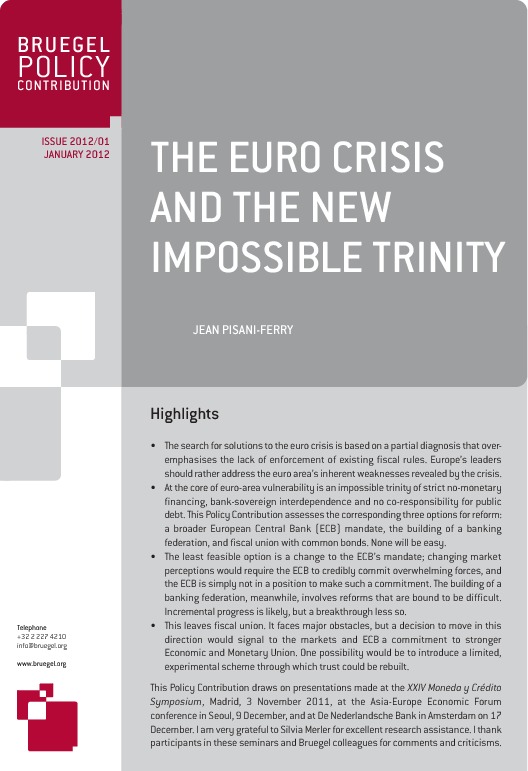Policy Contribution
The Euro crisis and the new impossible trinity
The search for solutions to the euro crisis is based on a partial diagnosis that overemphasises the lack of enforcement of existing fiscal rules. Europe’s leaders should rather address the euro area’s inherent weaknesses revealed by the crisis.
The search for solutions to the euro crisis is based on a partial diagnosis that overemphasises the lack of enforcement of existing fiscal rules. Europe’s leaders should rather address the euro area’s inherent weaknesses revealed by the crisis.
At the core of euro-area vulnerability is an impossible trinity of strict no-monetary financing, bank-sovereign interdependence and no co-responsibility for public debt. This Policy Contribution assesses the corresponding three options for reform: a broader European Central Bank (ECB) mandate, the building of a banking federation, and fiscal union with common bonds. None will be easy.
The least feasible option is a change to the ECB’s mandate; changing market perceptions would require the ECB to credibly commit overwhelming forces, and the ECB is simply not in a position to make such a commitment.
The building of a banking federation, meanwhile, involves reforms that are bound to be difficult. Incremental progress is likely, but a breakthrough less so.
This leaves fiscal union. It faces major obstacles, but a decision to move in this direction would signal to the markets and ECB a commitment to stronger Economic and Monetary Union. One possibility would be to introduce a limited, experimental scheme through which trust could be rebuilt.
This Policy Contribution draws on presentations made at the XXIV Moneda y Crédito Symposium, Madrid, 3 November 2011, at the Asia-Europe Economic Forum conference in Seoul, 9 December, and at De Nederlandsche Bank in Amsterdam on 17 December. I am very grateful to Silvia Merler for excellent research assistance.
I thank participants in these seminars and Bruegel colleagues for comments and criticisms.








